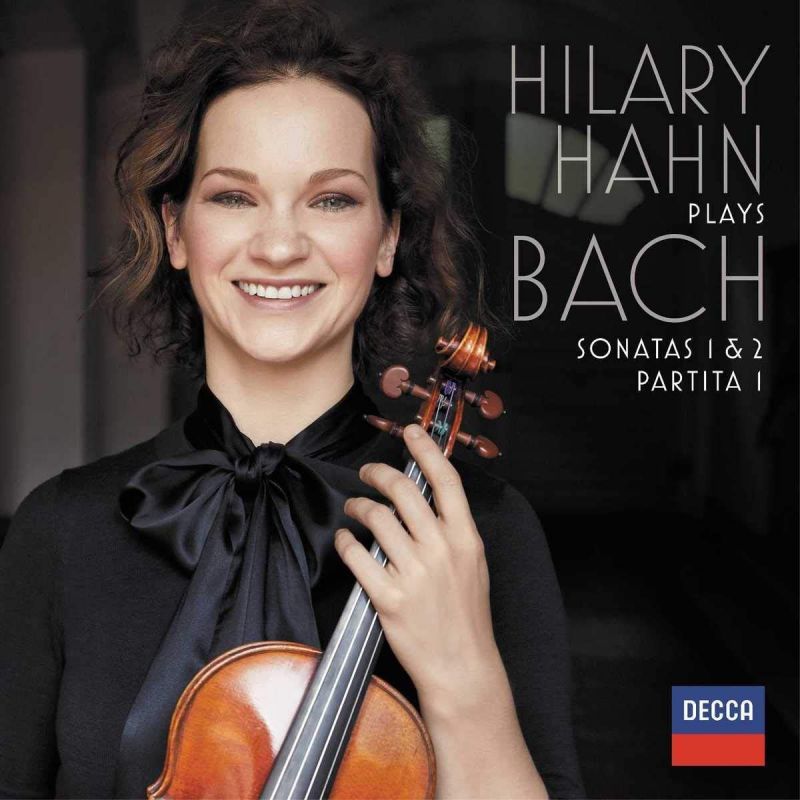JS BACH Solo Violin Sonatas Nos 1 & 2 (Hahn)
View record and artist detailsRecord and Artist Details
Composer or Director: Johann Sebastian Bach
Genre:
Instrumental
Label: Decca
Magazine Review Date: 11/2018
Media Format: CD or Download
Media Runtime: 76
Mastering:
DDD
Catalogue Number: 483 3954DH

Tracks:
| Composition | Artist Credit |
|---|---|
| (3) Sonatas and 3 Partitas, Movement: Sonata No. 1 in G minor, BWV1001 |
Johann Sebastian Bach, Composer
Hilary Hahn, Violin Johann Sebastian Bach, Composer |
| (3) Sonatas and 3 Partitas, Movement: Sonata No. 2 in A minor, BWV1003 |
Johann Sebastian Bach, Composer
Hilary Hahn, Violin Johann Sebastian Bach, Composer |
| (3) Sonatas and 3 Partitas, Movement: Partita No. 1 in B minor, BWV1002 |
Johann Sebastian Bach, Composer
Hilary Hahn, Violin Johann Sebastian Bach, Composer |
Author: Rob Cowan
And what about the A minor Sonata’s gently pulsing Andante? To call this playing miraculous might seem like hyperbolic overkill, until you actually hear it for yourself. Not since Heifetz, whose approach is similarly vocal, have I heard such eloquent reportage of this heavenly music, Hahn keeping the gently palpitating accompaniment audibly supportive of the top line, her sound consistently warm, her tone rich but never overbearing, the general mood solemnly imploring. Come the midway point (at around 2'46") and she cues a brief pause for breath, which in turn allows us room for thought. Indeed, I would cite this track in particular (track 15) as an appropriate sampling point for anyone who normally finds Bach’s solo violin music a bit of a slog to listen to, the sound and approach are so utterly seductive.
The opening of the G minor Sonata’s Adagio is uncommonly broad, the ensuing monologue full of light and shade, the first four notes of the fugue that follows built on a subtle crescendo. As with the A minor Sonata’s Fugue, Hahn makes expressive capital out of Bach’s arpeggiated writing (which at 2'03" excitedly takes flight) with never a hint of ugliness. The B minor Partita is no less beautiful, the Allemande morphing into its ‘double’ on an even keel, Hahn here employing finely spun vibrato. All this made me wish that she’d now go back and re record that first (Sony) programme so that we could have all six solo works captured in what is surely her prime. The actual recording process was interesting in that Hahn started working on the new album some six years ago. She then shelved what she had done and went back to the project five years later, so what we have here was recorded between June 2012 and June 2017, the majority from the latest sessions. All this is typical of Hahn’s almost Gouldian approach to recording, and the results are spectacular.
As to digital comparisons (and apologies in advance for the seemingly unavoidable gender bias) there will be those who favour the ascetic tone and more demonstrable flexibility of, say, Alina Ibragimova (Hyperion, 11/09); or Julia Fischer (Pentatone, 6/05), an imaginative player who steers a course somewhere between Hahn and Ibragimova; or Rachel Podger (Channel Classics, 7/99, 12/99) whose cool, limpid handling of the music also works well. Collectors who prefer this period-savvy approach are therefore very well served. As ever, the ‘problem’ of period performance versus post-Romantic interpretation will open a critical chasm. It always does. But I cannot pose as a fraud just because my tastes, and the tastes of various others, happen to run counter to current trends in Bach scholarship. As Nicholas Kenyon meaningfully asked in our October issue, what did Bach sound like in his day? More to the point, in this particular context, would hearing Hilary Hahn’s performing gifts have dazzled him with new-found expressive potential for an instrument that he loved and played himself? What would his violin music have sounded like thereafter? We could speculate endlessly but I rather suspect that he would have loved what he heard and acted accordingly. Maybe it’s a generational thing; but, speaking personally, Hahn touches my heart in a way that the players quoted above don’t, so while scribbling this ‘rave’ review (which it undoubtedly is) I can at least acquit myself with a good conscience. You should by now know whether or not this CD is for you. I adored it.
Discover the world's largest classical music catalogue with Presto Music.

Gramophone Digital Club
- Digital Edition
- Digital Archive
- Reviews Database
- Full website access
From £8.75 / month
Subscribe
Gramophone Full Club
- Print Edition
- Digital Edition
- Digital Archive
- Reviews Database
- Full website access
From £11.00 / month
Subscribe
If you are a library, university or other organisation that would be interested in an institutional subscription to Gramophone please click here for further information.




